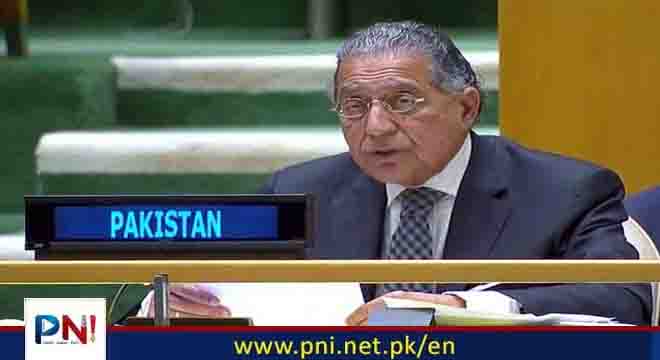UNITED NATIONS, Oct 15 : Describing India’s occupation of Jammu and Kashmir as the “worst manifestation of modern-day colonialism,” Pakistan has underscored the need for the resolution of the decades-old dispute over the Himalayan state to achieve durable peace in South Asia.
“The United Nations and all its Member States are bound by the UN Charter to promote a peaceful settlement of the Jammu and Kashmir dispute in accordance with the UN Security Council resolutions and the wishes of the Kashmiri people,” Ambassador Munir Akram, permanent representative of Pakistan to the UN, told the General Assembly’s Special Political and Decolonization (Fourth) Committee on Monday.
Noting that since 1946, 80 former colonies have gained independence, he said, “There are still peoples who are denied the right to self-determination, among them the people of occupied Kashmir and Palestine.”
Condemning Israeli genocidal war against the Palestinian people and the aggression against Lebanon, the Pakistani envoy said, “Israel’s massacres and brutalities will not extinguish the struggle for freedom and self-determination of the people of Palestine”. In this context, he advocated a two-state solution to usher in lasting peace in the Middle East.”
“Similarly, India’s occupation of Jammu & Kashmir is another worst manifestation of modern-day colonialism,”he added.
The right of self-determination of the Kashmiri people, Ambassador Akram said, was explicitly recognized in UNSC resolution 47 (1948) and several subsequent resolutions, which prescribed that the final disposition of the State of Jammu & Kashmir should be decided by its people through a free and fair plebiscite held under UN auspices.
These resolutions were accepted by both India and Pakistan, he said.
“Under Article 25 of the UN Charter, both parties are obliged to implement these resolutions,” he added.
On Kashmir, the Pakistani envoy said, “For 75 years, through force and fraud, India has avoided the implementation of UN resolutions, and since 1989, it’s ‘brutal’ campaign of repression killed 100,000 Kashmiris.
Since August 5, 2019, he said, “India has taken ‘Unilateral and illegal steps’ to annex occupied Kashmir in what its leaders have termed as a ‘Final Solution’.”
“Resolution 122 (1957) of the Security Council provides that unilateral measures ‘to determine the future shape and affiliation of the entire state or any part thereof, would not constitute a disposition of the state’”, Ambassador Akram said.
“Consequently, all unilateral actions taken by India on and after August 5, 2019 are not only illegal, but, ipso facto, null and void,” he added.
Underscoring that the resolution of the Jammu & Kashmir dispute is essential to achieve durable peace in South Asia, Ambassador Akram said, “The onus is on India to create conditions for a dialogue towards its settlement.”
He said, “India must stop its human rights violations in occupied Jammu and Kashmir; halt and reverse the process of demographic change there; and rescind the illegal and unilateral measures imposed on and after August 5, 2019.”
Pointing out that the Kashmiri people have rebuffed New Delhi’s unilateral measures and continue to struggle for freedom and self-determination, Ambassador Akram said, “They have conveyed this rejection even in the sham elections organized by India, expressing support for the revival of their usurped rights.”
Follow the PNI Facebook page for the latest news and updates.








